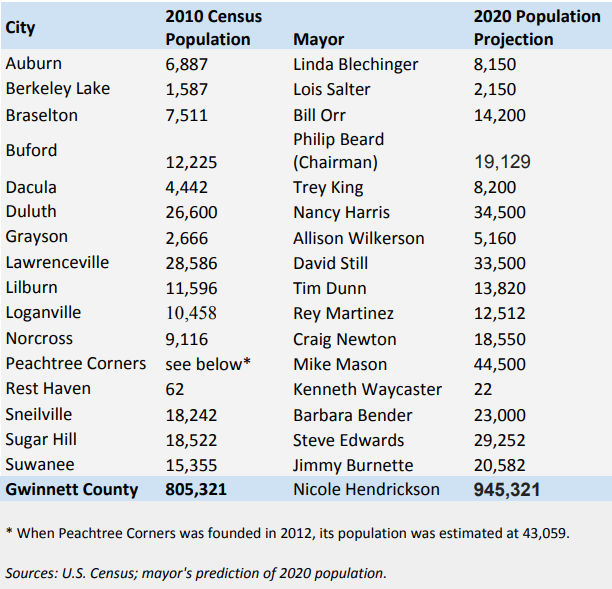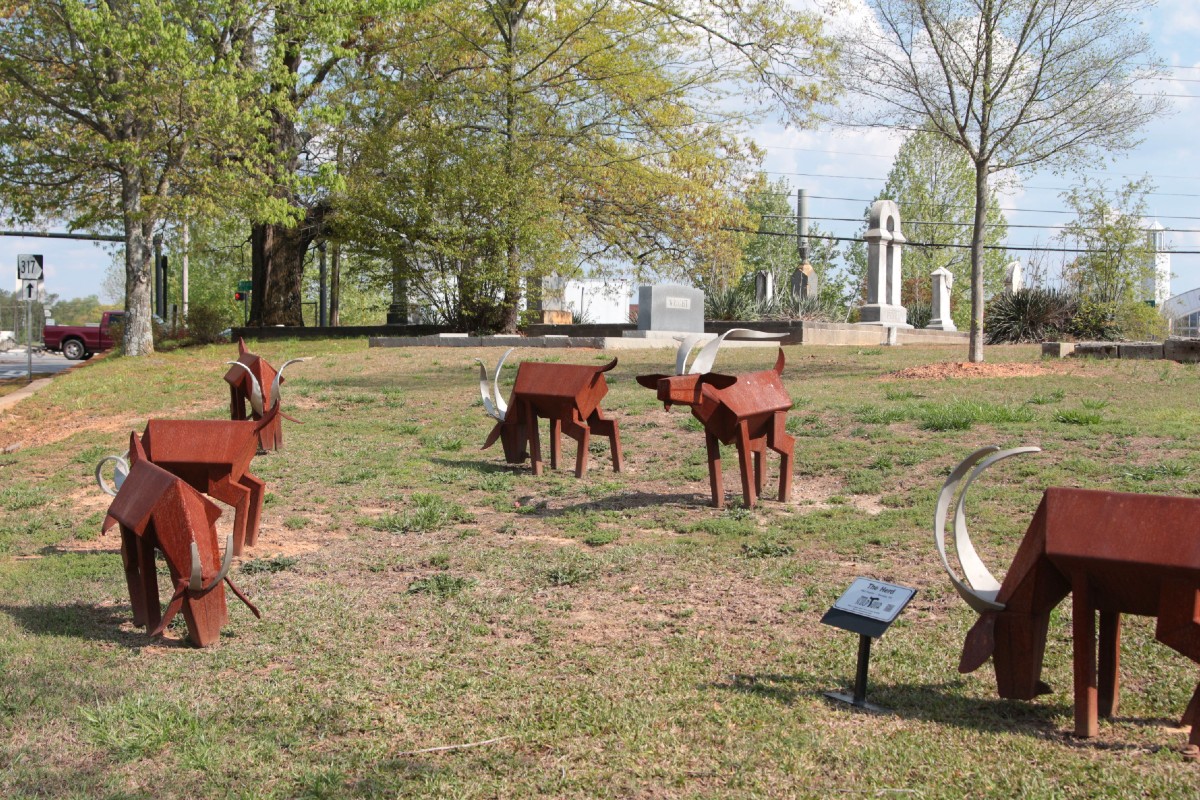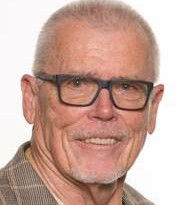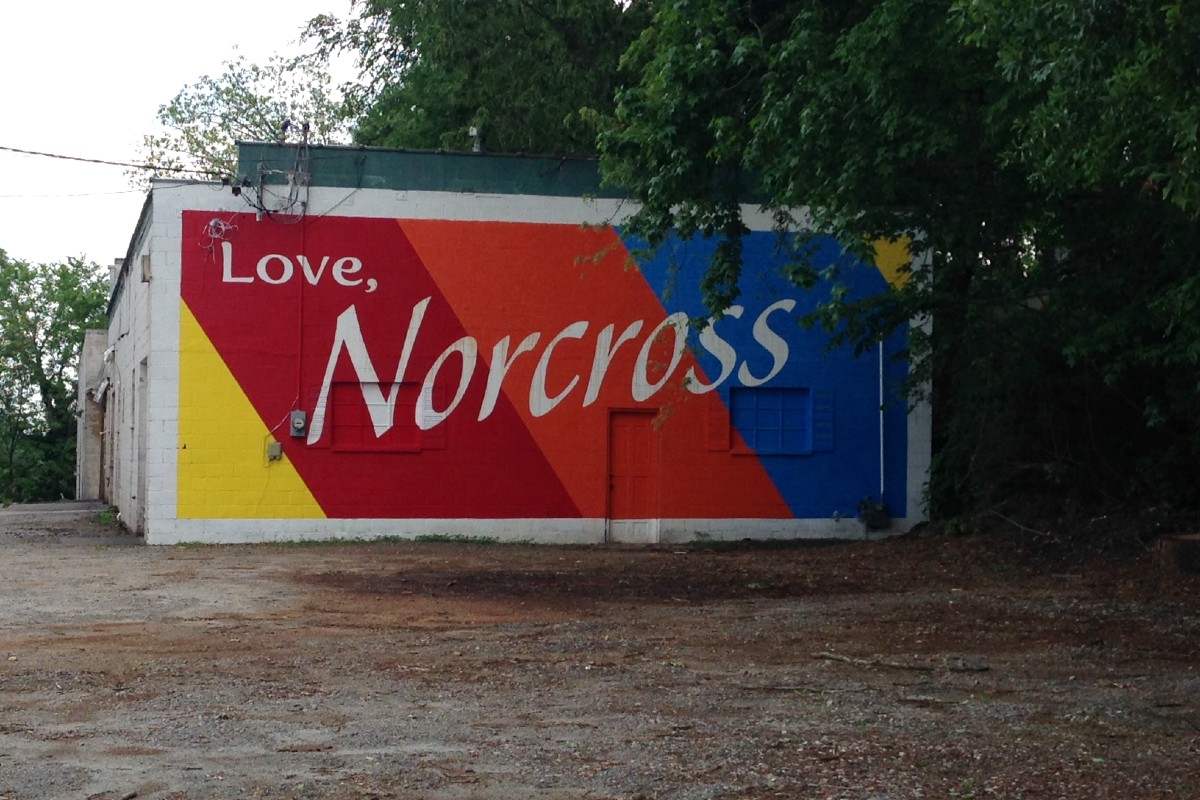GwinnettForum | Number 21. 34 | April 30, 2021
MUNCHING? These days you often hear of herds of goats being used to clear out large spaces of overgrowth. These goats along the Lawrenceville-Suwanee Road near Buford Highway won’t get much munching done, but they form an artistic attraction. The goats were created by Artist Phil Proctor of Atlanta. The Herd was part of our 2015 SculpTour exhibit and won the People’s Choice vote. The Suwanee Public Art Commission then purchased The Herd for the city’s permanent collection. (Photo from the Suwanee web site by Paul Bara.)
EDITOR’S NOTE: It’s vacation time for GwinnettForum. The next edition will come to your email box on May 11, 2021.
TODAY’S FOCUS: Gwinnett Cares hosts fifth healthcare summit on May 12
EEB PERSPECTIVE: Top officials predict what their city census count will be
ANOTHER VIEW: “They’re on the county” had its own special meaning
SPOTLIGHT: Heaven and Alvarez, LLC
FEEDBACK: Norfolk Southern responds about Samuel Spencer statue
UPCOMING: Gwinnett to get $28.1 million for rental assistance program
NOTABLE: HUD deadline for homeless block grants is May 27
RECOMMENDED: The Exiles by Christina Baker Kline
GEORGIA TIDBIT: Jean Toomer is author of book of African American life in Georgia
MYSTERY PHOTO: This Mystery Photo is a mural, which needs more information
CALENDAR: Concerts return to Snellville on May 8
Gwinnett Cares hosts 5th healthcare summit May 12
By Paige Havens
LAWRENCEVILLE, Ga. | Gwinnett Cares, will host its fifth online healthcare summit since the pandemic outbreak from 8 a.m. until 9:45 a.m. via Zoom and Facebook Live at @GwinnettCares.org. This is a continuation to help educate the local community about how to best navigate, co-exist with, and now build immunity to COVID-19. National, statewide and local public health officials, as well as elected officials and mental health advisors, will join the call to share the latest on the current state of COVID-19 response and care. The summit is powered by the Gwinnett Coalition for Health and Human Services, in partnership with the Gwinnett Newton Rockdale Health Departments.
 Key discussion topics for this session will include:
Key discussion topics for this session will include:
- Vaccine confidence – what we need to know about Johnson and Johnson;
- How safety protocols are working to keep us safe;
- Research and vaccine developments moving forward;
- Global surges – the vaccines vs. variants;
- Vaccination efforts to-date and progress on herd immunity;
- Risk assessments;
- Vaccination strategy – safely, swiftly, equitably – data informed decisions;
- Taking vaccination efforts mobile;
- Scheduling resources;
- New safety guidelines post-vaccination;
- Consumer beware – watching for scams;
- Public/Private partnerships;
- Dealing with anxiety – the healing process;
- Kids’ resiliency – physically and mentally; and
- How to better support our children and prepare them to return to school.
Distinguished subject matter experts scheduled to present are:
- Dr. Henry Bernstein, Advisory Committee on Immunization Practices – Centers for Disease Control and Prevention;
- Dr. Audrey Arona, District Health Director – Gwinnett Newton Rockdale Health Departments;
- Sheila Lovett, Immunization Director – Georgia Department of Public Health;
- Marlene Fosque, District 4 Commissioner – Gwinnett County;
- Chelsea Walker, LCSW, Wellness Program – Children’s Healthcare of Atlanta; and
- Gloria Juliao, director of Play Therapy – View Point Health.
The summit will be hosted virtually via Zoom and broadcast via Facebook Live at @GwinnettCares.org. Register to attend at http://bit.ly/BeWellGwinnett. The webinar is free and open to all. Live interpretation will be offered via Zoom in Spanish, Korean and Vietnamese.
This event is offered as a service to the community to provide factual, science-based information we need to safely navigate and coexist with COVID-19. The summit will update residents on the most recent and accurate healthcare protocols, vaccination information, and community resources available to help us all move successfully from crisis to relief to recovery.
- Have a comment? Send to: elliott@brack.net
Top officials predict what their city census count will be
By Elliott Brack
Editor and Publisher, GwinnettForum
APRIL 30, 2020 | The 2020 Census state population figures were released this week, providing little information for us except which states gained and lost population. A more detailed and useful release of Census data will come in August, when we will know population figures down to cities and counties.
![]() If nothing else, that means August will be the earliest Georgia can begin to re-draw Congressional district lines, and county commission and school board configurations. Establishing these boundaries will go a long way in determining the make-up of governmental districts. If we are not vigilant, it might turn into political gerrymandering, which can take away rights for minorities.
If nothing else, that means August will be the earliest Georgia can begin to re-draw Congressional district lines, and county commission and school board configurations. Establishing these boundaries will go a long way in determining the make-up of governmental districts. If we are not vigilant, it might turn into political gerrymandering, which can take away rights for minorities.
With all that said, let’s try to have some fun with the Census that will be released in August.
We asked the mayors of the 16 cities in Gwinnett, plus Chairwoman Nicole Hendrickson, to predict what they think will be the population of their political area as of April 1, 2020, the date the Census was taken. We think you will find interesting these projections by the county leader and the mayors of the city leaders.
 Study their projections in the accompanying table.
Study their projections in the accompanying table.
County Commission Chairwoman Nicole Hendrickson predicts the county population at 945,321, up from 805,321 in 2010. That means that the county will have grown by 140,000, or 14,000 a year, since 2010.
In growing Gwinnett, it’s expected that its cities will have increases in population, that is, except for Rest Haven. Mayor Kenneth Waycaster tells me that many of his 62 citizens that were there in 2010 have been annexed into Buford, therefore he predicts that the count for Rest Haven will be 22.
That small hamlet of a municipality, created in 1938 to thwart Buford’s growth, which probably never should have become a city, has been struggling at the Legislature level to de-classify itself as a city. Somehow, such a bill never succeeds. Any good Gwinnett legislator should champion its declassification, to simplify matters.
But back to the overall predictions: already many of the mayors are grumbling about a low count for one reason or another. All this is important for many reasons, the biggest being the population count determines how many different types of federal dollars are headed to the cities.
Even Mayor Mike Mason of the largest city, Peachtree Corners, is anticipating that the official count of its people may not go much past the estimated 43,059 population when the city was created in 2012. He’s figuring on having 44,500 people, and points to areas in his city where he thinks the undercount occurred.
Several of the smaller cities anticipate growth approaching 100 per cent. Bill Orr in Braselton thinks his 7,511 from 2010 will grow to 14,200. Mayor Trey King in Dacula predicts 8,200, up from 4,442. In Grayson, Mayor Allison Wilkerson feels her 2,666 from 2010 will grow to 5,160.
In Norcross, Mayor Craig Newton is predicting 18,550, up from 9,116, because of a large annexation in addition to overall growth.
Lawrenceville has been the biggest city in Gwinnett since 1960, up until Peachtree Corners was founded, so now it is second largest. Mayor David Still’s prediction of 33,500 would place it third if Duluth Mayor Nancy Harris’ anticipation of having 34,500 people is correct.
One more thought: Sugar Hill will vault to fourth largest should Mayor Steve Edward’s anticipation of 29,252 is right.
As for now, simply check out their predictions. We’ll await August to see how close these officials came to predicting the Census.
- Have a comment? Send to: elliott@brack.net
“They’re on the county” had its own special meaning
By Ashley Herndon
OCEANSIDE, Calif. | From growing up in Georgia, I remember the phrase “They’re on the county!”
Now that phrase does not mean someone is standing in Gwinnett County or any other place. It means they are, in some way, dependent on their county government for some sustenance or at one time even a residence. I can remember overhearing adults refer to “some folks as such.” Some of the adults spoke of how hard times had hurt others, while there were those who looked down on the recipients of county help or even made fun of them.
I also remember my Grandparents, as meager as their living was on the farm outside Snellville, making sure those in need received some help. Granny, the mother of 11, would travel to local farms as a nurse to practice skills she learned I don’t know where.
Now today half a million or more Americans are homeless. None of those are members of Congress. The median net worth of members of Congress who filed disclosures last year is just over $1 million.
Recently the Senate approved the latest Covid relief package on a 50-49 vote. Thank goodness for that, but shame on how the vote was spread. There have been nine Congressional pay raises during the time there have been no Federal minimum wage increases. (This recent Congress package had to give up a new minimum wage in order to get passed.) When you remember that members of the House and Senate spent was over $6 billion getting elected, that figures out roughly $11 million per member.
But let’s come back to: 49 Senators thought so much of their constituents that they voted NO against this relief.
A recent New York Times opinion piece details how Emperor Titus instituted a social welfare program after Vesuvius covered Pompeii with 20 feet of ash and lava. This helped maintain Rome’s economy and helped create a new class of successful workers and entrepreneurs.
Queen Elizabeth 1 was not to be outdone by a Roman: In 1601, England was experiencing a severe economic depression, with large scale unemployment and widespread famine. Queen Elizabeth proclaimed a set of laws designed to maintain order and contribute to the general good of the kingdom: the English Poor Laws.
These laws remained in force for more than 250 years with only minor changes. Essentially, the laws distinguished three major categories of dependents: the vagrant, the involuntary unemployed, and the helpless. The laws also set forth ways and means for dealing with each category of dependents. Most important, the laws established the parish (i.e., local government), acting through an overseer of the poor appointed by local officials, as the administrative unit for executing the law. It lasted for 250 years, until the Industrial Revolution.
Interestingly, those who did not pay simply were jailed. Horrors!
The 49 in the Senate need some education about humanity. Wonder how they would feel about some jail time? Maybe they could help by rescinding the Republican tax breaks for the wealthy. That would be a chunk of cash to help those in need.
Let’s end with “Selah,” the Hebrew word used in Psalms that means “to praise” or “pause and reflect upon what has just been said.”
- Have a comment? Send to: elliott@brack.net
Heaven and Alvarez, LLC
 The public spiritedness of our sponsors allows us to bring GwinnettForum.com to you at no cost to readers. Heaven and Alvarez, LLC is a certified public accounting firm working with their client to provide solutions for success. They are located at 4720 Peachtree Industrial Boulevard, Suite 201, Berkeley Lake, Georgia. They work in partnership with their clients to address the financial and accounting needs of their businesses, develop tax strategies, and develop plans for their clients regarding estate planning, business succession planning, and benefit and retirement planning. The firm can be reached at 770-849-0078.
The public spiritedness of our sponsors allows us to bring GwinnettForum.com to you at no cost to readers. Heaven and Alvarez, LLC is a certified public accounting firm working with their client to provide solutions for success. They are located at 4720 Peachtree Industrial Boulevard, Suite 201, Berkeley Lake, Georgia. They work in partnership with their clients to address the financial and accounting needs of their businesses, develop tax strategies, and develop plans for their clients regarding estate planning, business succession planning, and benefit and retirement planning. The firm can be reached at 770-849-0078.
- Their website is www.heavencpa.com.
- For a list of other sponsors of this forum, click here.
Norfolk Southern responds about Samuel Spencer statue
Editor, the Forum:
![]() As has been recently reported, Norfolk Southern and the City of Atlanta have reached an agreement on the temporary relocation of the Samuel Spencer statue currently in place at 1200 Peachtree Street N.E. To clarify, the statue is property of the city of Atlanta and predates Norfolk Southern’s administrative presence in the city. While keeping Spencer’s statue in front of our building was appropriate, the incoming owners of the building do not have connections to Mr. Spencer and do not wish for the statue to remain.
As has been recently reported, Norfolk Southern and the City of Atlanta have reached an agreement on the temporary relocation of the Samuel Spencer statue currently in place at 1200 Peachtree Street N.E. To clarify, the statue is property of the city of Atlanta and predates Norfolk Southern’s administrative presence in the city. While keeping Spencer’s statue in front of our building was appropriate, the incoming owners of the building do not have connections to Mr. Spencer and do not wish for the statue to remain.
Since it is their property, the city will decide its next location. To help the city, Norfolk Southern has offered to arrange for the removal of the statue and store it in a secure location until its new residence is determined. This arrangement has been in discussion for quite some time, with Norfolk Southern having announced its upcoming move in 2018.
— Jeff DeGraff, Manager Media Relations, Norfolk Southern Corporation
Amazed to find himself on agreement on healthcare-for-all
Editor, the Forum:
To my amazement, I agree with Jack Bernard’s points on healthcare-for-all. The only way to do that is to prohibit private health insurance. He is also right that President Trump went in the wrong direction on this and it, not the Russians, likely cost him the presidency.
The money Trump approved on COVID relief is a cheap shot unless Jack is aiming to take President Biden to task as well both on COVID and the infrastructure(less) bill.
–Joe Briggs, Suwanee
Suggests expanding Supreme Court giving each party a pick
Editor, the Forum:
One method to expand the Supreme Court by two would be to allow each political party to appoint one ; therefore, absorbing the case load described by George Wilson, yet maintaining the current status of the court . Appointments to fill vacancies due to retirements or death would still be the duty ( privilege) of the political party in power at the time .
—John Moore Sr., Duluth
Dear John: Good idea, but do you ever think the two parties can agree on solving the case load, when they can’t seem to agree on anything else much? —eeb
Enjoyed singing along during Prince Philip’s funeral
Editor, the Forum:
In my search for my ancestors, I have learned many songs from England and Scotland. As I watched the early tributes to Prince Phillip, I thought that if there ever was someone who lived “I Vow to Thee My Country,” it was Philip. I watched the funeral on BBCNews and that was the first song the military bands performed, then “Jerusalem,” followed by “The Navy Hymn,” and ended with “Nimrod” from the movie “Dunkirk.” I knew the words and sang along.
— Byron Gilbert, Duluth
Send us your thoughts: We encourage you to send us your letters and thoughts on issues raised in GwinnettForum. Please limit comments to 300 words, and include your hometown. We reserve the right to edit for clarity and length. Send feedback and letters to: elliott@brack.net
Gwinnett to get $28.1 million for rental assistance program
The Gwinnett Board of Commissioners has announced that the County is now accepting applications for Project RESET 2.0, an expansion of its emergency rental assistance program. The County will use more than $28.1 million in stimulus funds from the federal Emergency Rental Assistance Program to make payments directly to landlords and utility providers for renters’ past-due balances.
 Gwinnett County Chairwoman Nicole Hendrickson says she wants residents to know that the County is here to help .“The past year has been a difficult one for everyone, but especially for those with the added stress of wondering whether they’ll be able to stay in their home or pay their utility bills. I truly hope anyone who has been struggling with past-due rent and utility payments will look into Project RESET 2.0.”
Gwinnett County Chairwoman Nicole Hendrickson says she wants residents to know that the County is here to help .“The past year has been a difficult one for everyone, but especially for those with the added stress of wondering whether they’ll be able to stay in their home or pay their utility bills. I truly hope anyone who has been struggling with past-due rent and utility payments will look into Project RESET 2.0.”
The original Project RESET program — developed last fall by Chief Magistrate Kristina Hammer Blum, District 4 Commissioner Marlene Fosque and HomeFirst Gwinnett’s Matt Elder — used CARES Act funding to make past-due rent payments directly to landlords in order to prevent imminent evictions and keep tenants stably housed. As of April 23, the program used $6 million to intervene in more than 1,300 potential evictions.
HomeFirst Gwinnett Director Matt Elder thanked the County for its collaboration on the original Project RESET program, as well as its expansion. “The success we had with Project RESET 1.0 is a testament to what is possible when our County leaders and nonprofits work together to strategize and develop comprehensive solutions,” Elder says.
HUD deadline for homeless block grants is May 27
Gwinnett County is accepting applications for federal Housing and Urban Development Block grants from nonprofits and local governments through Thursday, May 27.
The County received approximately $4.4 million in Community Development Block Grants, about $1.7 million in HOME Investment Partnership Grants, and $376,000 in Emergency Solutions Grants. Grant funds are available for local nonprofits and governments that support affordable housing and the needs of Gwinnett’s homeless and low-income communities.
CDBG grants can cover the purchase of buildings by nonprofits and a wide range of construction uses including sidewalks, streets, parks and homeless shelters. Grant funds must benefit lower-income areas. CDBG grants can also be applied to job training programs, youth services and programs for seniors.
HOME Investment Partnership Grants must increase safe, decent and affordable housing opportunities for low-income households; expand the capacity of non-profit housing providers; and increase housing supportive services for targeted populations. Funding can be used for home construction, land acquisition, purchase and rehabilitation of single- or multi-family homes or helping tenants with rent. HOME grants require a 25 percent match from the awarded agency.
Emergency Solutions Grants are intended to offer housing choices to people who are homeless or facing eviction. The money can be used to support temporary emergency housing, eviction prevention, and assistance with moving into permanent housing. The grant requires a 100 percent match from the awarded agency.
- The online application is available on at GCGA.us/HUDGrants. Applications and supporting documentation must be completed using the online portal before Thursday, May 27 at 5 p.m.
The Exiles by Christina Baker Kline
![]() From Karen J. Harris, Stone Mountain: This is a portrait of how penal colonies existed in the founding of Australia. The three characters, Evangeline, Hazel and an aboriginal character, Marthina, each experience extraordinary trials while trying to extricate themselves from untoward experiences. Evangeline is accused of theft and attempted murder while serving as a governess. Sentenced to Newgate before being put in transport, otherwise known as a sentence to Australia as a convict, she meets Hazel, who is sentenced for theft as a pickpocket in London. The brutality they experience in transport is unimaginable. Marthina is stolen from her tribe by an English family who rescue and tame natives. When Marthina does not completely abandon her roots, she is cast adrift to the penal colony for children who often die in the grim circumstances. The story covers a period of two years and is not an easy read. The writing is beautiful; the story is challenging.
From Karen J. Harris, Stone Mountain: This is a portrait of how penal colonies existed in the founding of Australia. The three characters, Evangeline, Hazel and an aboriginal character, Marthina, each experience extraordinary trials while trying to extricate themselves from untoward experiences. Evangeline is accused of theft and attempted murder while serving as a governess. Sentenced to Newgate before being put in transport, otherwise known as a sentence to Australia as a convict, she meets Hazel, who is sentenced for theft as a pickpocket in London. The brutality they experience in transport is unimaginable. Marthina is stolen from her tribe by an English family who rescue and tame natives. When Marthina does not completely abandon her roots, she is cast adrift to the penal colony for children who often die in the grim circumstances. The story covers a period of two years and is not an easy read. The writing is beautiful; the story is challenging.
An invitation: what books, restaurants, movies or web sites have you enjoyed recently? Send us your recent selection, along with a short paragraph (150 words) as to why you liked this, plus what you plan to visit or read next. Send to: elliott@brack.net
Toomer is author of book of African American life in Georgia
Jean Toomer is best known as the author of the 1923 novel Cane, an influential work about African American life in which Toomer drew largely on his experiences in Hancock County. Toomer wrote Cane after he left his home in Washington, D.C., and worked briefly as a substitute principal at a Black industrial school in the middle Georgia town of Sparta. There he experienced a creative outpouring of poetry, drama, stories, and sketches that formed Cane, a narrative that begins in the rural South, switches to the urban North, and returns to the South for its conclusion. “Sempter,” the southern setting of Cane, is modeled on Sparta and the people and places Toomer encountered there in the fall of 1921.
Jean Toomer was the adopted literary name of Nathan Pinchback Toomer, born on December 26, 1894, in Washington, D.C. His parents were Nathan Toomer and Nina Pinchback. Toomer’s father was a freedman farmer from Houston County who had accrued considerable wealth as the widower of Amanda America Dickson, a formerly enslaved Georgia plantation heiress. Soon after young Toomer was born, his father abandoned the family and returned to Georgia.
When Toomer’s mother died in 1909, Toomer went to live with his maternal grandparents, and in 1914 he graduated from Washington’s M Street High School. He then attended colleges in Wisconsin, Massachusetts, Illinois, and New York before he rejected the idea of a college degree in favor of a writing career.
In the fall of 1921 he accepted a short-term job as a substitute principal at the Sparta Agricultural and Industrial Instituted. Toomer found that he was overflowing with stories and poetry inspired by the Georgia landscape, the African American voices, and the interracial encounters of the southern Blacks and whites he met in the Jim Crow–era agricultural town. Cane was the result.
Writers of the Harlem Renaissance and the Black Arts Movement have repeatedly cited Cane‘s influence on their own writing. After Cane, however, Toomer refused to be held up as a “Negro artist.” To the disappointment of many of his admirers, by 1924 he had exhausted his interest in African American characters. Critics and editors have often considered Toomer’s subsequent creative efforts to be no more than transparent, allegorical vehicles.
In 1940 Toomer joined the Quakers, who were a sustaining comfort and influence throughout the rest of his life. He lectured for the Religious Society of Friends and wrote extensively for Quaker publications in the 1940s and 1950s. A resident of Doylestown, Pennsylvania, from 1934 onward, Toomer died in a Pennsylvania nursing home of arteriosclerosis on March 30, 1967.
Although he wrote throughout his life, Toomer’s literary visibility effectively ended in 1936, with the last publication in his lifetime, the long poem “Blue Meridian,” which extolled the potential of an “American” race, a “blue” hybrid that would incorporate and extend the spirits of the Black, white, and Native American races. Cane was reissued for the first time in paperback in 1969, and it has become a classic text of African American studies.
In 2002 Toomer was inducted into the Georgia Writers Hall of Fame.
- To view the Georgia Encyclopedia article online, go to http://georgiaencyclopedia.org
This Mystery Photo is a mural, which needs more info
Many Gwinnett cities are getting murals painted on the sides of buildings. There’s no mystery as to where this photograph was taken, but give more information. Tell us more exactly where this mural is located, and any more details you might have about it. Send your answer to elliott@brack.net to include your hometown.
 For the last Mystery Photo, Lynn Naylor, Norcross, recognized the portrait of Jazz Musician Lionel Hampton (1908 -2002) at the National Portrait Gallery of the Smithsonian Institute. She tells us that it was “a gift of Mayor Rudolph Giuliani on behalf of the people of New York City.” Furthermore, she adds: “Lionel Hampton began his musical career as a drummer until Louis Armstrong encouraged him to take up the vibraphone in the early 1930s. Hampton introduced that instrument to the jazz idiom and came to the attention of Benny Goodman in 1936. When Goodman formed the Benny Goodman Quartet, Hampton played ‘vibes’ and went on to direct the group’s recordings of such favorites as Dinah and Exactly Like You. In 1940 Hampton struck out on his own, incorporating such musicians as Charles Mingus, Quincy Jones, and Charlie Parker into the Lionel Hampton Orchestra. Hampton’s high-energy spontaneity was legendary: ‘We got no routine. We just act the way the spirit moves us.’”
For the last Mystery Photo, Lynn Naylor, Norcross, recognized the portrait of Jazz Musician Lionel Hampton (1908 -2002) at the National Portrait Gallery of the Smithsonian Institute. She tells us that it was “a gift of Mayor Rudolph Giuliani on behalf of the people of New York City.” Furthermore, she adds: “Lionel Hampton began his musical career as a drummer until Louis Armstrong encouraged him to take up the vibraphone in the early 1930s. Hampton introduced that instrument to the jazz idiom and came to the attention of Benny Goodman in 1936. When Goodman formed the Benny Goodman Quartet, Hampton played ‘vibes’ and went on to direct the group’s recordings of such favorites as Dinah and Exactly Like You. In 1940 Hampton struck out on his own, incorporating such musicians as Charles Mingus, Quincy Jones, and Charlie Parker into the Lionel Hampton Orchestra. Hampton’s high-energy spontaneity was legendary: ‘We got no routine. We just act the way the spirit moves us.’”
Several others recognized it, including: Kay Montgomery, Duluth; Susan McBrayer, Sugar Hill; George Graf, Palmyra, Va.; David Earl Tyre, Jesup; Howard Hoffman, Berkeley Lake; Virginia Klaer, Duluth; Allan Peel, San Antonio, Tex.; Lou Camerio, Lilburn, who said: “This is Lionel Hampton, painted by Fredrick J. Brown, who was born in Greensboro, Ga. but grew up on the south side of Chicago.”
![]() Concerts on the lawn in front of Snellville City Hall return May 8 with a Mom’s Night Out Shag music group The Swingin’ Medallions. The show starts at 5:30 p.m. and the first 100 mothers in attendance will receive a free rose. The concerts were not held last year because of the Covid pandemic. Masks and social distancing is encouraged. There will be sanitizing stations placed throughout the lawn for these free events.
Concerts on the lawn in front of Snellville City Hall return May 8 with a Mom’s Night Out Shag music group The Swingin’ Medallions. The show starts at 5:30 p.m. and the first 100 mothers in attendance will receive a free rose. The concerts were not held last year because of the Covid pandemic. Masks and social distancing is encouraged. There will be sanitizing stations placed throughout the lawn for these free events.
- Have a comment? Send to: elliott@brack.net
GwinnettForum is provided to you at no charge every Tuesday and Friday.
Meet our team
- Editor and publisher: Elliott Brack, 770-840-1003
- Managing editor: Betsy Brack
- Roving photographer: Frank Sharp
- Contributing columnist: Jack Bernard
- Contributing columnist: Debra Houston
- Contributing columnist: George Wilson
More
- Location: We are located in Suite 225, 40 Technology Park, Peachtree Corners, Ga. 30092.
- Work with us: If you would like to serve as an underwriter, click here to learn more.
Subscriptions to GwinnettForum are free.
- Click to subscribe.
- Unsubscribe. We hope you’ll keep receiving the great news and information from GwinnettForum, but if you need to unsubscribe, go to this page and unsubscribe in the appropriate box.
© 2021, Gwinnett Forum.com. Gwinnett Forum is an online community commentary for exploring pragmatic and sensible social, political and economic approaches to improve life in Gwinnett County, Ga. USA.














Follow Us